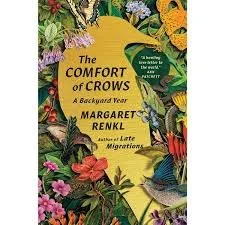The Comfort of Crows: A Backyard Year, by Margaret Renkl
I have seen this book described as a “literary devotional”, a devotional being a book that closely examines scripture and spiritual themes and helps the reader deepen their spiritual life. I would call this more of a natural devotional, as the author takes lessons from nature as observed in her own backyard, and applies these themes to her own life, the life of her neighbors and family, the society, and more broadly, the world. Renkl follows a year, beginning in deep winter at New Year’s, and presenting fifty-two essays, one for each week, interspersed with smaller observations she calls “Praise Songs.” She urges the reader to closely observe nature wherever they are, to glean life lessons from those meditations.
A contributing opinion columnist for The New York Times, Renkl is now in her mid sixties, and her essays are heavily influenced by her sense of time passing, and being in the last third of her life. Written during the pandemic, with two sons returning home to live and work remotely, she thinks about the fact that these sons will go off to live their lives as soon as society rights itself. Living in suburban Nashville, a city experiencing a housing boom, she sees the smaller homes around her being torn down to make way for bigger homes, the trees cut down, the grass lawns installed and maintained by herbicides and pesticides. She laments the passing of familiar routines, when children would play outdoors afterschool— now, ferried from activity to activity, children rarely get time to play outside, without adult intervention.
Renkl fights against encroachment and climate change by making her own half-acre into a wild oasis of native planting, a welcome spot to all manner of fauna. This does not always please her tidy neighbors, as she pointedly fails to rake autumnal leaves to help chipmunks, birds, and other animals. We hear of her heroic interventions to save endangered species, planting swaths of milkweed to feed migrating monarch butterflies, for example. She encourages the reader to both observation and active intervention. At a time when humans seem, to their own detriment, to be greatly removed from the natural world around them, living in their air controlled homes, cars, and workplaces. Renkl reflects on what is lost in our humanity.
By observing the parenting patterns of songbirds, she thinks about her own parenting journey. By witnessing the death of trees, she ponders death in her own life. By reflecting on her grandparents’ and parents’ relationships with nature, she enriches her own. Renkl find resilient life in every week, in each season, many lessons to be gleaned. She finds despair, joy, hope, and pleasure. Always enough to broaden and deepen a life. I recommend this meditative book, and hope it will encourage you to improve your connection with the natural world waiting beyond your doorstep.

